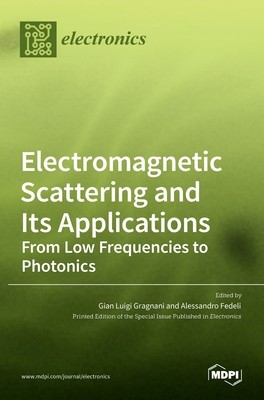
- We will send in 10–14 business days.
- Publisher: MDPI AG
- ISBN-10: 3036522077
- ISBN-13: 9783036522074
- Format: 17 x 24.4 x 1.3 cm, hardcover
- Language: English
- SAVE -10% with code: EXTRA
Electromagnetic Scattering and Its Applications (e-book) (used book) | bookbook.eu
Reviews
Description
Electromagnetic scattering is a very wide research topic and is behind the development of many devices and systems in everyday life: from mobile communication to radar apparatuses, from medical diagnostics to innovative materials, and so forth. Despite the significant advances made in the study of this subject, that goes back centuries, new applications are continuously emerging and stimulating researchers to face both theoretical and practical issues. This book aims at presenting innovative research contributions in different fields where electromagnetic scattering phenomena play an important role, which include scattering theory and modeling, numerical techniques, and applications.
We would like to thank all the contributors to this Special Issue and the reviewers who took the time to provide the authors with very valuable and constructive comments and suggestions. Without their invaluable contribution, this Special Issue would not have been possible.
Gian Luigi Gragnani
Alessandro Fedeli
EXTRA 10 % discount with code: EXTRA
The promotion ends in 16d.14:24:01
The discount code is valid when purchasing from 10 €. Discounts do not stack.
- Publisher: MDPI AG
- ISBN-10: 3036522077
- ISBN-13: 9783036522074
- Format: 17 x 24.4 x 1.3 cm, hardcover
- Language: English English
Electromagnetic scattering is a very wide research topic and is behind the development of many devices and systems in everyday life: from mobile communication to radar apparatuses, from medical diagnostics to innovative materials, and so forth. Despite the significant advances made in the study of this subject, that goes back centuries, new applications are continuously emerging and stimulating researchers to face both theoretical and practical issues. This book aims at presenting innovative research contributions in different fields where electromagnetic scattering phenomena play an important role, which include scattering theory and modeling, numerical techniques, and applications.
We would like to thank all the contributors to this Special Issue and the reviewers who took the time to provide the authors with very valuable and constructive comments and suggestions. Without their invaluable contribution, this Special Issue would not have been possible.
Gian Luigi Gragnani
Alessandro Fedeli


Reviews